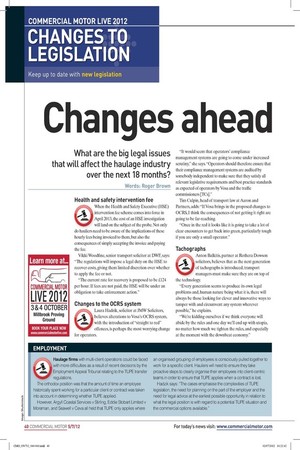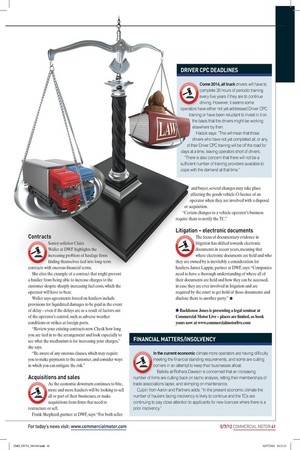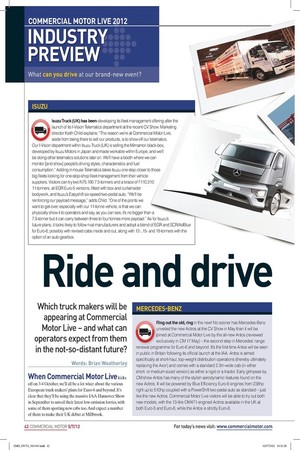Changes ahead
Page 31

Page 32

Page 33

If you've noticed an error in this article please click here to report it so we can fix it.
What are the big legal issues that will affect the haulage industry over the next 18 months?
Words: Roger Brown
Health and safety intervention fee
When the Health and Safety Executive (HSE) intervention fee scheme comes into force in April 2013, the cost of an HSE investigation will land on the subject of the probe. Not only do hauliers need to be aware of the implications of these hourly fees being invoiced to them, but also the consequences of simply accepting the invoice and paying the fee.
Vikki Woodfine, senior transport solicitor at DWF, says: “The regulations will impose a legal duty on the HSE to recover costs, giving them limited discretion over whether to apply the fee or not.
“The current rate for recovery is proposed to be £124 per hour. If fees are not paid, the HSE will be under an obligation to take enforcement action.”
Changes to the OCRS system
Laura Hadzik, solicitor at JMW Solicitors, believes alterations to Vosa’s OCRS system, with the introduction of “straight to red” offences, is perhaps the most worrying change “It would seem that operators’ compliance management systems are going to come under increased scrutiny,” she says. “Operators should therefore ensure that their compliance management systems are audited by somebody independent to make sure that they satisfy all relevant legislative requirements and best practice standards as expected of operators by Vosa and the traffic commissioners [TCs].” Tim Culpin, head of transport law at Aaron and Partners, adds: “If Vosa brings in the proposed changes to OCRS, I think the consequences of not getting it right are going to be far-reaching.
“Once in the red it looks like it is going to take a lot of clear encounters to get back into green, particularly tough if you are only a small operator.”
Tachographs
Anton Balkitis, partner at Rothera Dowson solicitors, believes that as the next generation of tachographs is introduced, transport managers must make sure they are on top of the technology.
“Every generation seems to produce its own legal problems and, human nature being what it is, there will always be those looking for clever and innovative ways to tamper with and circumvent any system wherever possible,” he explains.
“We’re kidding ourselves if we think everyone will abide by the rules and one day we’ll end up with utopia, no matter how much we tighten the rules, and especially at the moment with the downbeat economy.”
Contracts
Senior solicitor Claire Waller at DWF highlights the increasing problem of haulage firms finding themselves tied into long-term contracts with onerous financial terms.
She cites the example of a contract that might prevent a haulier from being able to increase charges to the customer despite sharply increasing fuel costs, which the operator will have to bear.
Waller says agreements forced on hauliers include provisions for liquidated damages to be paid in the event of delay – even if the delays are as a result of factors out of the operator’s control, such as adverse weather conditions or strikes at foreign ports.
“Review your existing contracts now. Check how long you are tied in to the arrangement and look especially to see what the mechanism is for increasing your charges,” she says.
“Be aware of any onerous clauses, which may require you to make payments to the customer, and consider ways in which you can mitigate the risk.”
Acquisitions and sales
As the economic downturn continues to bite, more and more hauliers will be looking to sell all or part of their businesses, or make acquisitions from firms that need to restructure or sell.
Frank Shephard, partner at DWF, says: “For both seller
DRIVER CPC DEADLINES
Come 2014, all truck drivers will have to complete 35 hours of periodic training every five years if they are to continue driving. However, it seems some operators have either not yet addressed Driver CPC training or have been reluctant to invest in it on the basis that the drivers might be working elsewhere by then.
Hadzik says: “This will mean that those drivers who have not yet completed all, or any, of their Driver CPC training will be off the road for days at a time, leaving operators short of drivers. “There is also concern that there will not be a sufficient number of training providers available to cope with the demand at that time.” and buyer, several changes may take place affecting the goods vehicle O-licence of an operator when they are involved with a disposal or acquisition.
“Certain changes to a vehicle operator’s business require them to notify the TC.”
Litigation – electronic documents
The focus of documentary evidence in litigation has shifted towards electronic documents in recent years, meaning that where electronic documents are held and who they are owned by is inevitably a consideration for hauliers. James Lappin, partner at DWF, says: “Companies need to have a thorough understanding of where all of their documents are held and how they can be accessed, in case they are ever involved in litigation and are required by the court to get hold of those documents and disclose them to another party.” n l Backhouse Jones is presenting a legal seminar at Commercial Motor Live – places are limited, so book yours now at www.commercialmotorlive.com
FINANCIAL MATTERS/INSOLVENCY
In the current economic climate more operators are having difficulty meeting the financial standing requirements, and some are cutting corners in an attempt to keep their businesses afloat.
Balkitis at Rothera Dawson is concerned that an increasing number of firms are cutting back on tacho analysis, letting their memberships of trade associations lapse, and skimping on maintenance.
Culpin from Aaron and Partners adds: “In the present economic climate the number of hauliers facing insolvency is likely to continue and the TCs are continuing to pay close attention to applicants for new licences where there is a prior insolvency.”
ISUZU
Isuzu Truck (UKQ has been developing its fleet management offering after the launch of its I-Vision Telematics department at the recent CV Show. Marketing director Keith Child explains: “The reason we’re at Commercial Motor Live, aside from being there to sell our products, is to show-off our telematics.
Our I-Vision department within Isuzu Truck (UK) is selling the Mimamori black-box, developed by Isuzu Motors in Japan and made workable within Europe, and we’ll be doing other telematics solutions later on. We’ll have a booth where we can monitor [and show] people’s driving styles, characteristics and fuel consumption.” Adding in-house Telematics takes Isuzu one step closer to those big fleets looking for one-stop-shop fleet management from their vehicle suppliers. Visitors can try two N75.190 7.5-tonners and a brace of F110.210 11-tonners, all EGR Euro-5 versions, fitted with box and curtainsider bodywork, and Isuzu’s Easyshift six-speed two-pedal auto. “We’ll be reinforcing our payload message,” adds Child. “One of the points we want to get over, especially with our 11-tonne vehicle, is that we can physically show it to operators and say, as you can see, it’s no bigger than a 7.5-tonner but it can carry between three to four tonnes more payload.” As for Isuzu’s future plans, it looks likely to follow rival manufacturers and adopt a blend of EGR and SCR/AdBlue for Euro-6, possibly with revised cabs inside and out, along with 12-, 15and 18-tonners with the option of an auto gearbox.
EMPLOYMENT
Haulage firms with multi-client operations could be faced with more difficulties as a result of recent decisions by the Employment Appeal Tribunal relating to the TUPE transfer regulations.
The orthodox position was that the amount of time an employee historically spent working for a particular client or contract was taken into account in determining whether TUPE applied.
However, Argyll Coastal Services v Stirling, Eddie Stobart Limited v Moreman, and Seawell v Ceva all held that TUPE only applies where an organised grouping of employees is consciously pulled together to work for a specific client. Hauliers will need to ensure they take proactive steps to clearly organise their employees into client-centric teams in order to ensure that TUPE applies when a contract is lost.
Hadzik says: “The cases emphasise the complexities of TUPE legislation, the need for planning on the part of the employer and the need for legal advice at the earliest possible opportunity in relation to what the legal position is with regard to a potential TUPE situation and the commercial options available.”










































